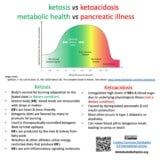Why evaluate dietary interventions? Are they just food?

Chris Palmer. MD just published Diets and Disorders: Can Foods or Fasting Be Considered Psychopharmacologic Therapies? It is in the Journal of Clinical Psychiatry(1) and you’ll find an executive summary in this post.
First I want to talk a bit about nutritional psychiatry and why it is important to us here at MetabolicMultiplier.org and to you too.
Food as medicine
The topic of food as metabolic medicine is becoming popular. Diets or supplements to treat diseases is an appealing, age-old concept. Dietary interventions seem harmless and natural, so we’d all like them to work. At first I react with, Yes! Hippocrates said, “Let food be thy medicine, and medicine be thy food.” I couldn’t agree more. But what food for which disorder, and where’s the evidence?
Our goal at MetabolicMultiplier.org
Our central goal at MetabolicMultiplier.org is to curate, synthesize and disseminate accurate, validatable information related to metabolic intervention. So the issue of evidence-based intervention is important to us. This article of Dr. Palmer’s is a fine example of metabolic intervention applied to the treatment of mental disorders. He uses the ketogenic diet in his psychiatric practice, an example of food as medicine. This dietary intervention has voluminous research backing its use for epilepsy. An evidence-based intervention always has research backing.
Evidence-based therapy
What I like about Dr. Palmer’s latest article is his evaluation of the proposed dietary interventions for mental disorders using available science. He does this to evaluate the validity of the health claims surrounding each treatment.
Backing proposed interventions with research-based rationale is essential. We all hope we can improve our health with food. It is such a natural and intuitive desire. But to effectively use foods, supplements, or diets as interventions requires evidence. To make medical claims, and to offer these as a treatment to patients, clinicians must be as sure as possible that no harm is done and that the treatment helps.
The hope for a positive effect of any particular dietary intervention must be assessed with research lest it harm rather than help. Dr. Palmer’s article sorted help from harm for five different types of dietary interventions . Take a look: Diets and Disorders: Can Foods or Fasting Be Considered Psychopharmacologic Therapies?
And, as usual, Dr. Palmer has no disclosures of any financial conflicts of interest.
I’ve summarized this article for you below.
Your executive summary – Diets and Disorders:
Can Foods or Fasting Be Considered Psychopharmacologic Therapies?
By Chris M. Palmer MD
- Patients want dietary interventions
- “When thinking about dietary interventions, there are several models to consider…”, including:
1. Adding supplements or foods –
- Omega 3 fatty acids: Some positive studies showing some benefit, but more research is needed. EPA, one type of omega 3, appears more promising than DHA, another type of omega 3, but there’s no clear answer here.
- While both depression and schizophrenia are associated with a folate (a B vitamin) deficiency, studies to test treatment with this vitamin have yielded mixed results, so there’s no clear answer here either.
- Vitamin E has been tested for several disorders, all the studies have been negative.
- Vitamin D levels are often low in people with psychiatric disorders; however, studies using Vitamin D as a treatment have given mixed results.
2. Removing a food or substance
This refers to diets that remove foods thought to be unhealthful while adding foods thought to be healthful, e.g., creating a “healthy” diet. One randomized controlled (RCT) trial, the SMILES study, did show positive results when putting depressed people on a Mediterranean diet. This RTC showed a 32% remission rate which is significant.
3. The gut microbiome
While it is becoming clear that the gut microbiome affects the brain, metabolism, and inflammation, interventions based on altering the gut bacteria with probiotic supplementation have almost no research data to support their effectiveness.
4. Fasting and the ketogenic diet
The ketogenic diet and fasting are well-established interventions for treatment-resistant epilepsy in children, with numerous supporting studies. In psychiatry, the research is just starting. There are case studies and an animal study suggesting they may be helpful in reducing the symptoms of schizophrenia, but RTCs are needed before more definitive claims can be made.
Conclusion
While dietary interventions are desired by patients and clinicians alike, the truth is that the evidence to back their use is often nascent, conflicting, or limited. As Chris states: “Foods and fasting can sometimes have psychopharmacologic properties, but many claims are unfounded or have been disproved. Despite this, many of our patients are trying these interventions.”1(1) Randomized controlled studies are urgently needed to test the safety and efficacy of these interventions.
Other articles that may interest you
You can see a more in-depth discussion of the brief fasting intervention in Dr. Palmer’s Psychology Today article Exercise and Fasting Linked to Brain Detox.
Other resource guides & toolkits you might value
Curious about improving metabolic health with lifestyle?
- Lifestyle Medicine, the key to metabolic healing
- What is metabolic health? A layperson’s definition and a biochemist’s perspective
Where do I start improving my metabolic health?
- Your patient toolkit for prediabetes & type 2 diabetes
- What to eat? Get clever! Clinicians’ flexible approach to tailoring carb reduction to you.
- Want more detail on carbohydrate reduction? A round-up of quality, what-to-eat guides from around the web
- Best resources for an overview of keto – Metabolic Multiplier’s round up of the best resources we’ve found by evidence-based organizations & clinicians. For patients, families & caregivers.
- Keto doctors near me – over 20 directories of low-carb professionals
For clinicians using therapeutic carbohydrate reduction (TCR), ketogenic diet therapies (KDT)
- Best Keto resources for clinicians & other practitioners
- How to build my ketogenic therapy treatment team – Support for the more complex cases.
- Why write medical case reports about unique cases? – Our round up can save you time.
For colleagues interested in amplifying metabolic health
- Overview schematics help us think about metabolic health – Understand our Organizing Research team‘s thinking behind these 3 metabolic health research portals
- Communication guide to unite advocacy for metabolic health – Suggested language metabolic health advocacy. Principles. Language to use or avoid. Food & lifestyle first.
- Style Guide to unite advocacy for metabolic health – Welcome new team members! Many of you encourage using one voice for metabolic health. Below are suggestions from your fellow clinicians, scientists and professionals. See our Communication Guide as well. We’d love to hear…
- What Foundations support Metabolic Health? Charities, advocacy & grassroots groups using metabolic interventions & health to treat metabolic conditions.
Sources:
- Palmer, C. Diets and Disorders: Can Foods or Fasting Be Considered Psychopharmacologic Therapies? The Journal of Clinical Psychiatry. 2020;81(1):19ac12727.
- Palmer, C. Diets and Disorders: Can Foods or Fasting Be Considered Psychopharmacologic Therapies? The Journal of Clinical Psychiatry. 2020;81(1):19ac12727. [↩]











1 Response
[…] lifestyle interventions are also fitted to the patient’s preferences and goals of care. For example, patient preferences […]